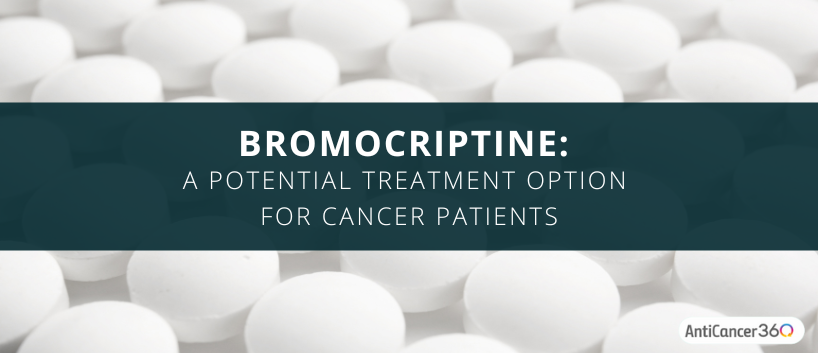Medical Disclaimer: The information in this article is intended for educational purposes only. It is not meant to replace medical advice, diagnosis, or treatment from a healthcare provider. Please consult a healthcare practitioner before starting any new medications.
Cancer is a devastating disease that affects millions of people worldwide. Although traditional treatments such as chemotherapy and radiation have been effective, they often come with significant side effects. As a result, researchers have been exploring alternative treatment options, including repurposing existing medications.
When faced with a cancer diagnosis, you want to do everything you can do to both understand the condition and fight it. There are many ways to fight cancer and, hopefully, beat it into remission. There are conventional therapies that most people are familiar with, and there are also additional options to consider, especially if your cancer is advanced, including off-label use of certain prescription medications.
At AntiCancer360, we have published articles examining older medications and their excellent potential for new, off-label uses in fighting cancer. We have already reviewed drugs like Ivermectin, Doxycycline, Aspirin, and Metformin.
We detail a variety of potential anti-cancer benefits of each medication. Building on our series, have you heard of bromocriptine? This medication, traditionally used for conditions like Parkinson’s disease, is now being studied for its anticancer properties.
Today’s article will focus on a prescription medication called bromocriptine, also known by its brand name, Parlodel or Cycloset.
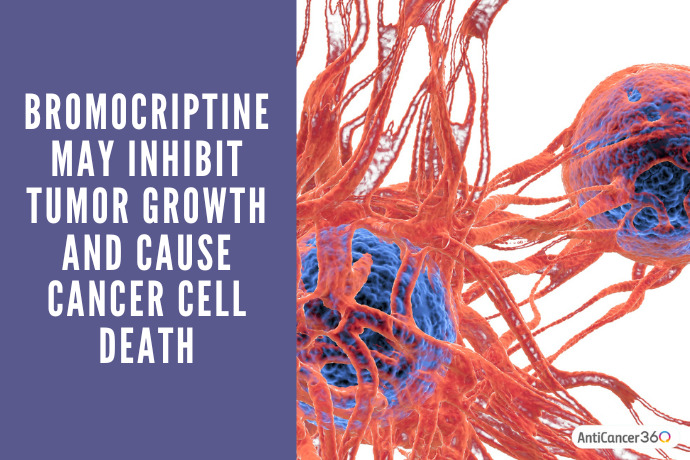
Bromocriptine, a dopamine receptor agonist, has shown promise in preclinical studies as a potential treatment for various types of cancer. Its ability to inhibit tumor growth and induce cancer cell death has sparked interest among scientists and oncologists. In this article, we will delve into the potential benefits of bromocriptine as a probable treatment option for cancer patients and the ongoing research in this field.
Introduction to Bromocriptine and its Uses
Despite advancements in medical treatments, there is still a great need for more effective and targeted therapies. One potential treatment option currently being explored is bromocriptine, a medication initially developed for other purposes but showing promise in oncology.
Bromocriptine is a dopamine receptor agonist initially developed for treating Parkinson’s disease and other neurological disorders. However, recent research suggests that it may also have anti-cancer properties. Several studies have shown that bromocriptine can inhibit the growth and proliferation of cancer cells, making it a potential treatment option for different types of cancer.
Bromocriptine is a medication used to treat conditions such as Parkinson’s disease, acromegaly, hyperprolactinemia-associated dysfunctions, and type 2 diabetes. It belongs to a few medication classes, including antiparkinson agents, antidiabetic agents, and dopamine agonists [1].
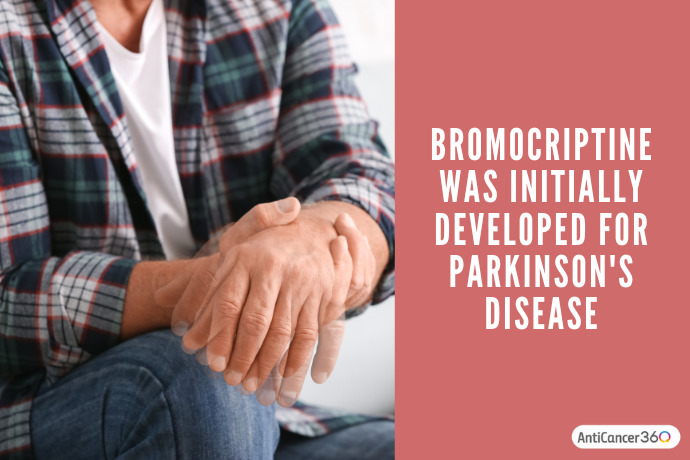
Here is a quick summary of basic facts about Bromocriptine:
- Brand names: Cycloset, Parlodel
- Generic available: Yes
- Drug form: Capsule, tablet
- Classification: Antidiabetic, Antiparkinsonian, Central Nervous System Agent, Dopamine agonist, Endocrine-Metabolic Agent, Prolactin Secretion Inhibitor
- Status in the U.S.: Prescription (Rx)
- Initial FDA approval: 1978
Bromocriptine has been found to exert anticancer effects on pancreatic cancer cells, breast cancer, and pituitary hormone-dependent tumors. Additionally, when given in conjunction with cytotoxic medications, bromocriptine may weaken chemo-resistant tumors.
Let’s take a closer look at bromocriptine’s anti-tumor effects.
Potential Anticancer Effects of Bromocriptine on Cancer
One of the mechanisms through which bromocriptine exerts its anti-cancer effects is targeting angiogenesis, the process of forming new blood vessels that tumors rely on for their growth. Research has shown that bromocriptine can inhibit the production of vascular endothelial growth factor (VEGF), an essential protein involved in angiogenesis. By blocking VEGF, bromocriptine can effectively starve tumors of their blood supply, leading to their regression [2].
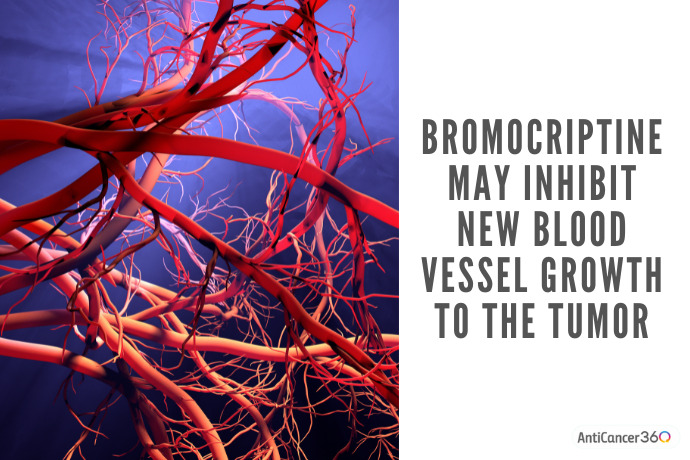
Dopamine agonists, like Bromocriptine, have been shown to downregulate proangiogenic factors and upregulate antiangiogenic factors, resulting in a reduction in lesion size and vascular density. Dopamine and dopamine agonists have advantages over other angiogenic inhibitors, such as monoclonal antibodies, including greater availability, lower cost, and potentially fewer adverse effects. Clinical trials are currently underway to evaluate the efficacy of dopamine agonist-related drugs as antiangiogenic options in various diseases [3].
A second mechanism by which bromocriptine exerts anticancer activity is the drug’s ability to thwart cancer cell chemoresistance. Bromocriptine is a potent and selective inhibitor of chemoresistant prostate cancer (PCa) cells, exhibiting high specificity and potency in these cells. Bromocriptine induced cell cycle arrest and apoptosis in chemoresistant PCa cells, effectively inhibiting their proliferation.
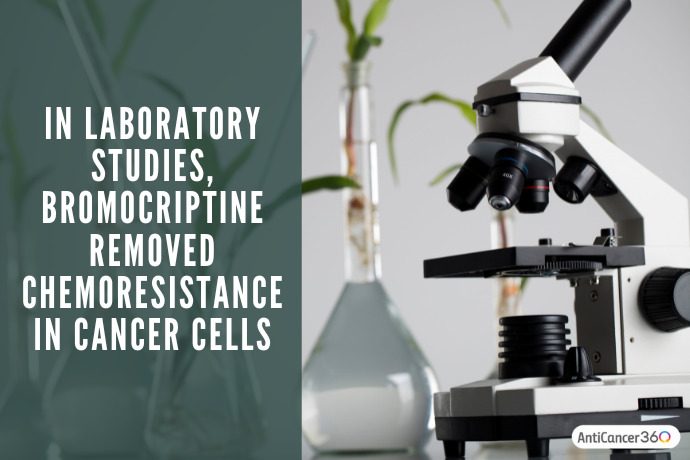
Bromocriptine significantly affects the transcriptome (the full range of messenger RNA coding for a variety of proteins) of chemoresistant PCa cells, leading to the upregulation of genes involved in inhibiting the cell cycle and activating cell death and the downregulation of genes implicated in DNA replication and the cell cycle. The drug also affects multiple cell cycle regulators and signaling pathways in chemoresistant PCa cells, including RB-E2F-c-Myc, MDM2-p53-p21, Skp2-p27, PKA-CREB, ERK1/2, AMPK, p38 MAPK, NF-κB, EZH2-Stat3, and survivin. Lastly, bromocriptine demonstrated inhibition of skeletal growth of chemoresistant PCa xenografts in mice, leading to reduced PSA levels, improved skeletal architecture, and decreased proliferation of tumor cells [4].
Another fascinating way that bromocriptine may be effective in cancer treatment is its actions on hormone-independent and multidrug-resistant (MDR) tumors. Studies have revealed bromocriptine to be cytotoxic towards drug-sensitive and multidrug-resistant leukemic cells and wild-type or multidrug-resistant breast cancer cell lines [5].
Researchers learned from the in-vitro studies genes from various functional groups such as ribosomal proteins, transcription, translation, DNA repair, DNA damage, protein folding, mitochondrial respiratory chain, and chemokines correlated with cellular response to bromocriptine. Bromocriptine inhibited drug-resistant tumor cells with different resistance mechanisms in a hormone-independent manner, suggesting its potential for repurposing in cancer therapy. The combination of bromocriptine with doxorubicin or paclitaxel resulted in synergistic effects in leukemic cells, inducing apoptosis in these cells, with more than 15% of cells appearing in late apoptosis after treatment [6].
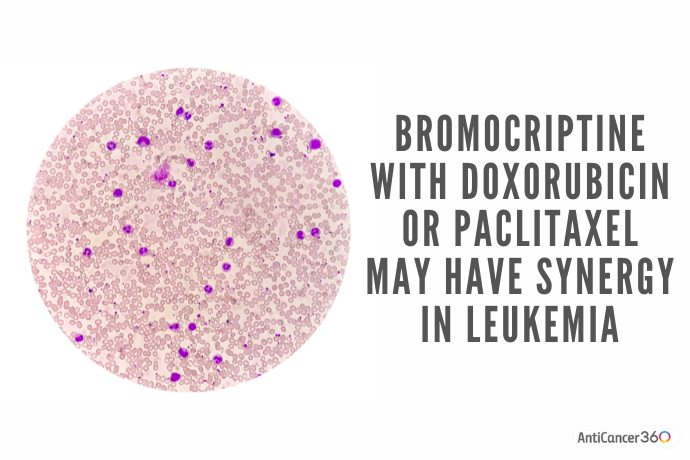
These results are promising, though more studies and data are necessary to support bromocriptine’s role in fighting cancer. Regardless, many people are choosing to augment their anticancer care options by using bromocriptine off-label.
Future Research and Developments in the Use of Bromocriptine for Cancer Treatment
While bromocriptine’s potential as a cancer treatment is promising, more research is needed to fully understand its efficacy and safety profile when prescribed in a cancer setting. Clinical trials are ongoing to evaluate the effectiveness of bromocriptine in different types of cancer, and results so far have been encouraging. However, it is crucial to continue studying its potential side effects and interactions with other medications.
If proven successful, bromocriptine could offer an additional treatment option for cancer patients, particularly those who have developed resistance to current therapies or are not eligible for specific treatments. Its unique mechanism of action and favorable safety profile make it an attractive candidate for further investigation.
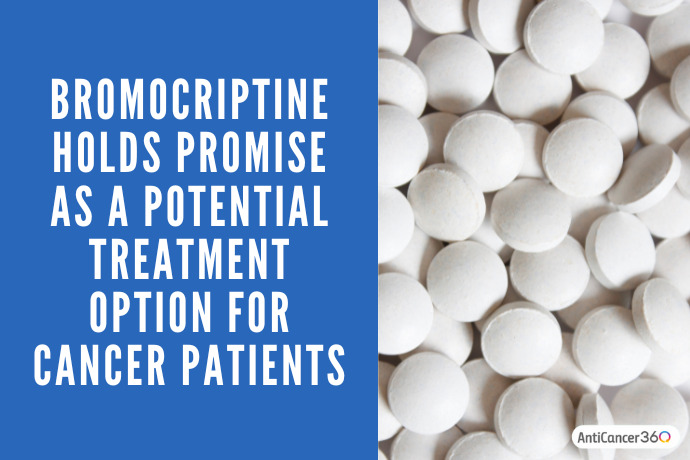
In conclusion, bromocriptine holds promise as a potential treatment option for cancer patients. Its ability to inhibit angiogenesis, enhance the immune response, and induce apoptosis in cancer cells makes it a valuable addition to the existing armamentarium of cancer treatments. As research progresses and more data becomes available, bromocriptine may prove to be a key player in improving cancer patients’ outcomes in the future.
Frequently Asked Questions about Bromocriptine: Dosages, Side Effects, and Precautions
Next, we will answer some commonly asked questions about bromocriptine.
How and where can I get bromocriptine?
Bromocriptine is a prescription medication that requires a prescription from a licensed healthcare provider, such as your primary care physician. It is essential to use bromocriptine precisely as your healthcare provider prescribes and follow their instructions regarding dosage and duration of treatment. Be sure to discuss any potential side effects or interactions with other medications before starting bromocriptine.
Is there any evidence to support bromocriptine as a cure for cancer?
There isn’t substantial evidence to support bromocriptine as a cure for cancer. Bromocriptine is primarily used to treat disorders related to high levels of prolactin, such as certain types of tumors in the pituitary gland.
While some studies might explore its potential effects on cancer cells in laboratory settings or animal models, the evidence isn’t strong or conclusive enough to consider it a cure for cancer in humans. Cancer treatment typically involves a combination of surgery, chemotherapy, radiation therapy, immunotherapy, or targeted therapy, depending on the type and stage of cancer. Consult a qualified healthcare professional for accurate information and guidance regarding cancer treatment options.
What is the dosage of bromocriptine for cancer?
Since bromocriptine isn’t an FDA-approved cancer treatment, there isn’t an approved or official dose for this purpose.
What are the side effects of bromocriptine?
Bromocriptine may cause side effects. Tell your doctor if any of these symptoms are severe or do not go away: nausea, vomiting, diarrhea, constipation, stomach cramps, heartburn, loss of appetite, headache, weakness, tiredness, dizziness or lightheadedness, drowsiness, difficulty falling asleep or staying asleep, depression [7].
Can Bromocriptine Help in the Fight Against Cancer?
While it is uncertain that bromocriptine can cure cancer and prolong survival, existing evidence suggests that it has promising effects in aiding the fight against cancer. Slowing the growth of cancer cells and boosting the immune system may help the body fight off cancerous cells.

Though animal and laboratory studies demonstrate that it can eradicate cancer, studies in humans showing sufficient evidence are needed before potential efficacy for cancer can be determined.
Ultimately, when using an Aggressive Integrative Approach to cancer, the goal is to fight cancer from every possible direction. This practice includes integrating repurposed medications and natural supplements to fight cancer in an evidence-based, safe way that shouldn’t interfere with your oncology treatment.
How are you approaching your cancer treatment? Are you integrating any natural supplements or strategic dietary approaches? Have you tried low-dose naltrexone or any other off-label medicines for your cancer? Please feel free to share your experience or feedback in the comments below!
Are You A Good Candidate For Our Program?
If you’d like to learn more about the AntiCancer360 approach and see if we can help you, Please watch our free online webinar to learn more about our approach. Then, at the end, you’ll be able to schedule a free call with someone from our team so that we can discuss your case in more detail.
Dr. Andrew Cox is a graduate of the University of Pittsburgh and is part of the AntiCancer360 team as a consultant pharmacist and medical writer. He received his Bachelor’s degree in Biology from Marist College and a Master of Arts in Cell Biology from Villanova University prior to completing his Doctor of Pharmacy at Pitt. He also completed his Masters of Business Administration from the University of Maine. His expertise helps us create safe herbal and supplement combinations and avoid potential drug interactions.
Andrew has been a licensed pharmacist since 2013 with experience in outpatient retail pharmacy, long term acute care, and managed care pharmacy. He is interested in the appropriate utilization of natural substances to effectively prevent and treat cancer in addition to the traditional treatment strategies. He is also interested in the research and the latest findings of the mechanisms by which various natural compounds affect the tumor microenvironment
In his free time, Andrew enjoys traveling, reading, and the Premier League games on the weekends. He resides in Pittsburgh, Pennsylvania with his wife, daughter, and a boxer mix named, Party Martie.

